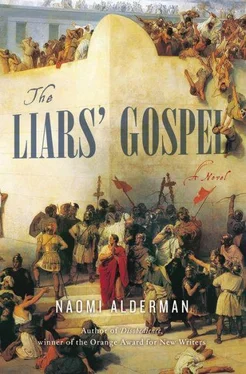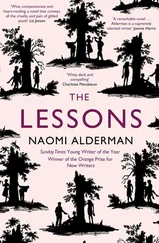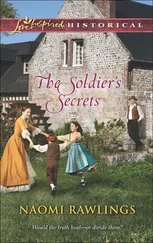And even as she says it she hears the voice in her head of Iehuda from Qeriot saying, “We are his family now, we who follow his teachings.” She sees her son’s face, the last time she spoke to him, when she felt afraid and did not know why. She knows he relinquished his family a long time before his death. If this child’s story were true, it would not be to her that he would have come. And this is too much to bear. She stands up quickly, her knees cracking and her back aching at the strain, and without knowing that she is going to do so she raises her right hand and hits Gidon across his left cheek.
The sound is loud. Her hand stings. She stares at him because she is an old woman and he a young man and if he responded in kind he could easily kill her.
He does not respond with a blow. He does not move or try to flee. He looks at her levelly and turns his face so that the opposite side is towards her. He waits. It is a kind of invitation.
Her hand falls to her side.
“I would have known from across the world if he were still in it.”
The first year she was a woman, her father had taken her to Jerusalem for Shavuot, the festival at the end of the seven weeks from Passover. It is a joyous festival, a simple one, a celebration of the harvest that is just beginning. Farmers bring the first fruits of their fields to the altar, to thank God for blessing their trees and their ripening vines and the swaying golden seas of their wheat. They stayed with her father’s younger brother, Elihu, who lived so close to the Temple that they could see its walls from the roof of his house. The early summer light was golden, but the days blew with a sweet breeze so that the heat did not thicken or the air become still. She sat at the window on the first day, watching the never-ending procession of oxen-pulled carts filled with ripe pink pomegranates and furry yellow dates heading for the Temple, and her heart was glad.
It was a good time to come to Jerusalem — especially for a girl who had become a woman, her mother said. The people had come from all corners of the land. A young man might notice her, or she might notice a young man. There were many nervous, eager, excited girls like her, walking to the Temple with their fathers, and many young men too. In the courtyard, her father gave her the coins to buy the lamb for the offering. She examined the creatures closely, chose one tied to the back of the stall, not the largest but with the purest white wool.
There were soldiers outside the Temple, of course, auxiliaries employed by Rome. She heard another man tell her father there had been a skirmish, swiftly quashed, earlier in the day when three farmers had attacked a soldier. Miryam’s father said nothing, though in the past she had heard him rail against the Romans, wishing that the people would rise up and drive them from the land. He put his arm around her shoulders as they entered the Temple and whispered, “If you see something like that while we are here, Miryam, run. The Romans cannot tell the guilty from the innocent. If there is a squabble, run to your uncle’s house, you will be safe there.”
They made their offering in peace. Seven baskets of the fruits of the land they brought to the priests: figs and barley, wheat and pomegranates, olives and dates and grapes dropping heavy on the vine. The pure white lamb was slaughtered, its blood scattered, its forbidden fats burned on the altar for the Lord. And they heard murmurings again as they left the Temple. The men gave one another secret signs, making a hand shape like a dagger and whispering low and confusing words.
Miryam’s father kept a tight arm around her and brought his lips close to her ear. “You see nothing,” he said. “You hear nothing. We feast with your uncle tonight and tomorrow we go home.”
When it happened, it was swift. They were walking past the spice market, homebound, and as they came in sight of the Hippodrome, with its tall colonnades and its fluttering flags, she knew something was wrong. Her father’s grip tightened on her shoulder. He stood still. Behind them, back the way they’d come, there was a tight knot of men, walking slowly but at a steady pace. The shutters on the buildings nearest the Hippodrome were shut and closed tight with wooden pegs. To the right, up the narrow alleyway, another small group of men. Burly farmers with corded muscular arms, each with a long bag on his back.
The soldiers on the steps of the Hippodrome were laughing. Two of them were throwing dice. The others had wagered money on the outcome. Some were on lookout, most were watching the game. Miryam’s father’s grip was like iron tongs on her shoulder. They were in a thin crowd — some other parents with children, or whole families, each looking as frightened as they. They walked into the Hippodrome square, moving as quickly as they could without breaking into a run. Passing an open doorway, she saw that the dark room beyond was full. She had the impression of watchful black eyes, of shifting flesh, of the dull sheen of metal. Men had come to Jerusalem from all over the country for this festival. The thing had been planned.
The day had grown overwarm and clouded, the sky off-white. The breeze faded away, the air was soft and moist as damp cloth. A splash of rain fell onto the cream marble plaza. A heavy, ripe droplet which burst on the dusty stone. And then another drop, and another. And as if the rain had been a signal they had agreed on long before, the men came.
Screaming, they ran. Dark-skinned and red-mouthed, letting every rasping breath go from their lungs with a cutting edge like their metal blades. Wild shouting, anger howling, swinging their iron arms like free men whose home was overrun by vermin, they pelted up the steps of the Hippodrome and began the slaughter. The first guards, shocked by the sudden inrush, legs trembling, died before they had unsheathed their swords. Miryam saw one split from stomach to throat — a quiet smiling man who had unloosened his breastplate with the hotness of the day. Another soldier went down screaming, calling to the garrison.
There were arms around her, suddenly. Strong arms around her waist and under her shoulders, lifting her up off the ground though she kicked and wrestled, pulling her back, gripping her close, and in her confusion it was several moments before she realized that the voice shouting in her ear, “Be still! Be still!” was her own father’s.
He ran with her, as the rain fell more strongly and the men screamed, ran back through the crowd. Charged at them with his shoulder, held her pressed close into his chest so that she could only inch her face to the side to breathe and, with one eye open, see glimpses of those who pushed forward. They were smiling hot, blood-grins. It was those soldiers who had taken their land, it was this man, and this, who had stolen their harvest, their women, their God. Miryam did not see where her father was running to, only that he was striving against the sea, pushing away from the place of blood.
When at last they came to rest and the noise was more distant, she saw at once that her father had taken two gashes, one across his shoulder, through the fabric of his robe, and one to his ear, which was half gone, the top sliced off, and oozing dark blood. He had collapsed, with her still grasped firmly by one of his arms, on a pile of sacks. They were in a dark room across the courtyard from the Hippodrome. She tried to stand up, but her father pulled her back.
“Be still,” he whispered, and fell back onto the sacks.
Clasped against his chest, Miryam could feel his breathing, rapid and shallow. His grip loosened, and she crawled out from under his arm, staying low. The shouting and the dreadful cries from the square were increasing. She saw a long trickle of blood run down her father’s neck and, feeling with her fingers in the gloom, found a wet patch on his skull. He was still breathing though. She put a palm in the center of his chest to reassure herself of that. Still, yes.
Читать дальше












